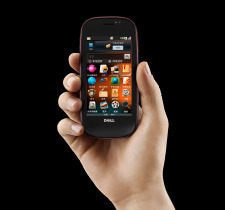Dell Android-based Mini 3 smartphone more proof that Google is a safe mobile bet

When Google first launched its free Android mobile operating system, its free and open nature was seen as too good to resist.
Dell's latest announcement (techmeme) of the Android-based Mini 3 smartphone is just one more example of mounting evidence that the OS is the way to go for a low-overhead, high-profile answer to the smartphone.
Dell did not reveal technical specifications or pricing information for the Mini 3 phone beyond a 3.5-in. HD touchscreen and the absence of Wi-Fi at launch.
But it did say that the first two carriers to sell the device would be China Mobile and Brazil's Claro.
It also said the phone will use OPhone, China Mobile's customized version of the Android OS.
The real story, however, is how quickly the Android army is mounting in the mobile space. Sure, we can compare the handsets to the Apple iPhone, Palm Pre or RIM BlackBerry handsets until we're blue in the face. But it's remarkable how, in just a year's time (the G1 launched exactly one year ago), Android-friendly manufacturers are flooding the marketplace with capable, familiar and inexpensive (for consumers and vendors) handsets.
The platform is so easy to implement that a traditional computing power like Dell is getting in on the action. (Here's where I should note that yes, Dell entered the PDA space years ago with the Axim, but the carrier-based mobile industry is a much different beast to conquer.)
Here's a prepared statement from Ron Garriques, president of Dell's Global Consumer Group:
"Our entry into the smartphone category is a logical extension of Dell's consumer product evolution over the past two years. We are developing smaller and smarter mobile products that enable our customers to take their Internet experience out of the home and do the things they want to do whenever and wherever they want."
In other words, smartphones are finally at the place where they can replicate many of the everyday functions of a web-connected personal computer: e-mail, chat, web browsing. How better to tighten the connection between PC and phone?
Instead of requiring PC giants to build out their own mobile development teams and reinvent the wheel, Google's Android platform allows them to receive the brains of a fully-featured basic smartphone (e-mail, browser, app market, Google services, touch interface) and add a dash of differentiation on top.
Voilà: Android à la mode.
Farm the hardware manufacture out to a contractor, slap your badge on the front and suddenly you've got a smartphone that's reasonably competitive with the best out there -- without the paid software license for each unit.
It's not quite that simple, but you get my point: Android makes it easy to get into the smartphone game without betting the entire farm. And until the vast majority of mobile users own smartphones, there's plenty of room to compete (and dollars to claim).
If Dell's Mini 3 phone falls flat, the potential financial pitfall is much smaller than if the company had built everything from scratch.
If the Mini 3 succeeds, it can pave the way for Dell to grow in the mobile space and claim a new, lucrative revenue stream.
Of course, there are several downsides to this concept: with focus on the software and not the hardware, handsets can come and go with little fanfare. Further, Android as a platform can be fragmented beyond recognition (and function) if vendors go too far in customization.
But the way I see it, Dell's just the latest high-profile tech company interested in spreading to the third screen: the mobile phone, in addition to the PC and the TV.
Apple proved with the iPhone that mobile can be very, very lucrative. Companies like Dell have noticed.
What Android does is (at least for now) ensure interoperability, familiarity and the capability to do what iPhones can do without requiring consumers to buy into a narrow, proprietary ecosystem (and carrier).
For most folks, that's just dandy. For tech companies, that's the safest mobile bet you can make.
